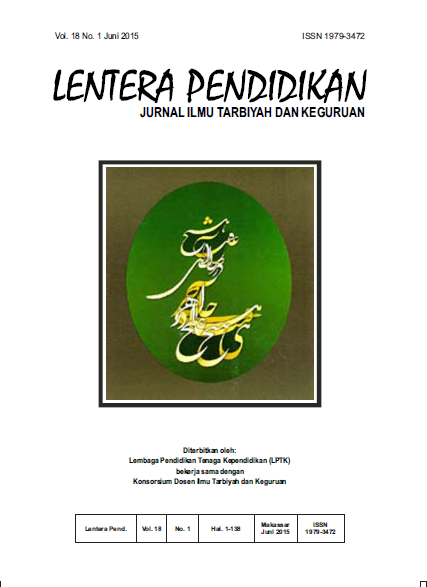EVALUASI KINERJA KEPALA SEKOLAH MENENGAH KEJURUAN NEGERI DI KOTA BANDAR LAMPUNG
Abstract
Abstract: The objective of this research was to determine the suitability of the principals’ performance in carrying out managerial tasks with the established standards, including performance in: (1) leading the school in the context of the utilization of school resources optimally, (2) managing changes and development of the school towards an effective learning organization, (3) creating a culture and school climate which are conducive and innovative, and (4) utilizing the advancement of ICT in learning and school management. The approach and evaluation model chosen in this study was a goal-based evaluation model which was combined with evaluation model that were generally developed in several government institutions. The research method was qualitative. The data were collected by using observation, interview, and documents. The results of the research showed that: (1) the performance of the principals in leading the school were in good category, (2) the performance of the principals in managing change and school development were in good category, (3) the performance of the principal in creating a culture and school climate were in good category, and (4) the performance of the principal in the use of ICT in teaching and school management were in enough category. The conclusion of the research was, of the four aspects of the performance of principals evaluated, three of them showed the achievement of performance was good category, and one aspect was in enough category. However, in each aspect in the evaluation there were still some performance criteria that have not been achieved well, or there were still in the enough category.
Abstrak: Tujuan penelitian ini adalah untuk mengetahui kesesuaian antara prinsip-prinsip kinerja yang digunakan dalam menunaikan tugas managerial dengan standar kinerja yang telah ditetapkan, meliputi: (1) upaya memajukan sekolah dalam konteks pemanfaatan sumber-sumber sekolah secara optimal; (2) mengelola perubahan-perubahan dan pengembangan sekolah menuju organisasi belajar yang efektif; (3) menciptakan budaya dan suasana sekolah yang kondusif dan inovatif; (4) penggunaan ICT dalam pembelajaran dan manajemen sekolah. Penelitian menggunakan pendekatan evaluasi sebagai dengan model goal based yang secara umum dikembangkan sebagai model mengevaluasi lembaga-lembaga pemerintahan. Penelitian menggunakan metode kualitatif. Data dikumpulkan dengan menggunakan observasi, wawancara dan dokumentasi. Hasilnya menunjukkan: (1) kinerja kepemimpinan di sekolah sudah dalam kategori baik, (2) prinsip-prinsip kinerja dalam mengelola perubahan dan pengembangan sekolah dalam kategori baik, (3) prinsip-prinsip kinerja dalam menciptakan budaya dan suasana sekolah dalam kategori baik, (4) prinsip-prinsip kinerja dalam menggunakan ICT pembelajaran serta pengelolaan sekolah dalam kategori baik. Kesimpulannya adalah, dari empat aspek prinsip kinerja yang dievaluasi, tiga diantaranya dalam kategori baik dan satu diantaranya kategori cukup.
Downloads
References
Danim, Sudarwan. Visi Baru Manajemen Sekolah: Dari Unit Birokrasi ke Lembaga Akademik. Jakarta: Bumi Aksara, 2007.
Sidi, Indra Jati, Menuju Masyarakat Belajar. Jakarta, Paramadina, 2003.
Mangkunegara, Anwar Prabu . Perilaku dan Budaya Organisasi, Bandung: Refika Aditama, 2005
Karwati, Euis dan Donni Juni Priansa, Kinerja dan Profesionalisme Kepala Sekolah. Bandung, Alfabeta, 2013
Rosidin, Undang dkk, Evaluasi Kinerja Penyelenggaraan RSBI di Kota Bandar Lampung. Hasil Laporan Penelitian, Bandar Lampung, 2011.
Suyanto, Perumusan Manajemen Bebrbasis Sekolah; htt://media.diknas.go.id/document. (diakses, 14 April 2013)
Thomas, John M dan Warren G. Bennis. The Management of Change and Conflict. Penguin Books, Baltimore, 1972.
Wirawan, Evaluasi: Teori, Model, Standar, Aplikasi dan Profesi. Jakarta, Rajawali Pers, 2011.
Yukl, Gary. Kepemimpinan dalam Organisasi.Edisi Bahasa Indonesia. Jakarta, Indeks Kelompok Gramedia, 2005.
Authors who publish with this journal agree to the following terms:
1) Authors retain copyright and grant the journal right of first publication with the work simultaneously licensed under a Creative Commons Attribution License that allows others to share the work with an acknowledgement of the work's authorship and initial publication in this journal.
2) Authors are able to enter into separate, additional contractual arrangements for the non-exclusive distribution of the journal's published version of the work (e.g., post it to an institutional repository or publish it in a book), with an acknowledgement of its initial publication in this journal.
3)Authors are permitted and encouraged to post their work online (e.g., in institutional repositories or on their website) prior to and during the submission process, as it can lead to productive exchanges, as well as earlier and greater citation of published work (See The Effect of Open Access).

